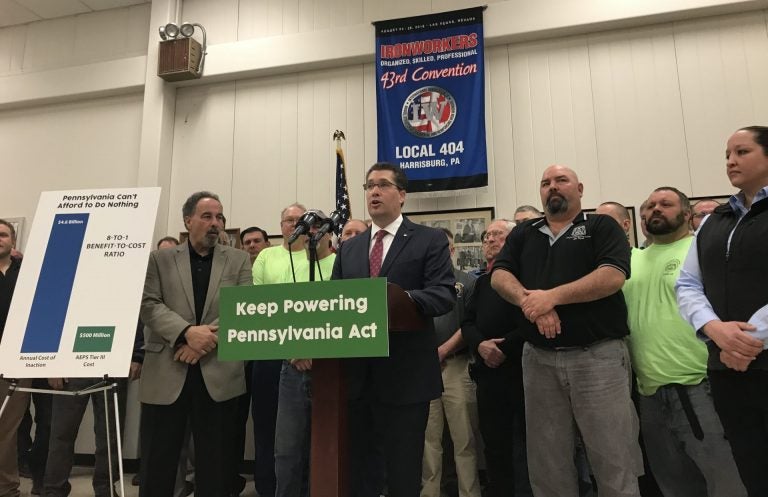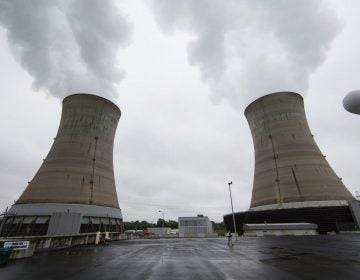Poll: Public split on whether state should act to prop up nuclear industry
A new poll found Pennsylvania voters generally support nuclear energy, but on the question of whether the state should prop up struggling plants, that support is mixed.

Rep. Thomas Mehaffie (R- Dauphin) unveils a bill aimed a preventing the early closure of two of Pennsylvania's five nuclear power plants. (Marie Cusick/StateImpact Pennsylvania)
This article appeared on StateImpact.
—
A new poll found Pennsylvania voters generally support nuclear energy, but on the question of whether the state should prop up struggling plants, that support is mixed. The poll was conducted by Franklin & Marshall in partnership with PA Post.
Among the key findings: 55 percent strongly or somewhat believed nuclear energy should be one component of the state’s long-term energy strategy, versus 32 percent who somewhat or strongly opposed the idea.
“Most people — a majority of registered voters in the state — do believe that nuclear energy has a part to play in the state’s long-term energy strategy,” said Berwood Yost, director of the Center for Opinion Research at Franklin & Marshall College, which conducted the poll.
But support wasn’t as strong on the question of whether to keep struggling nuclear plants open by classifying them as a form of alternative energy, as one bill before the Legislature would do.

“The public to me seems split on this issue. Half seem to favor it, half oppose or aren’t sure about the proposal, so I would say at the moment there’s no consensus,” Yost said.
About the same number of people strongly favor (18 percent) as those who strongly oppose the plan (17 percent).
Lawmakers recently took steps to save two struggling nuclear plants, Three Mile Island near Harrisburg, slated to shut this fall, and Beaver Valley in Shippingport, near Pittsburgh, which is scheduled to close in 2021.
A bill introduced in the Legislature would include nuclear in a list of energy sources that qualify for Pennsylvania’s Alternative Energy Portfolio Standard (AEPS). State law requires utilities to purchase portions of their electricity from clean and alternative sources, like wind and solar. Lawmakers estimate it would cost $500 million a year.
Other states, like New York, New Jersey, and Illinois, have approved legislation to support their ailing nuclear industries, though those moves could face legal challenges.
Yost said the poll showed one thing pretty clearly — the public doesn’t know that much about nuclear energy. Only one in 10 knew with certainty that nuclear energy was Pennsylvania’s largest source of carbon-free electricity. Nuclear power contributes around 40 percent of the state’s electricity, and 93 percent of the state’s carbon-free electricity.
“They don’t necessarily know how much it contributes to the state’s electricity supply. They don’t seem to know a lot about how important it is in terms of its contribution to carbon-free electricity,” Yost said.
Yost said one explanation is a lack of public discussion about nuclear energy.
“There’s been no one really advocating for nuclear energy on a widespread basis that might build that kind of support for it,” Yost said. “It’s hard to build a lot of momentum and support for something if it’s not discussed frequently. It’s not in the news, really, and there’s been no real advocates for nuclear energy that are high profile.”
Support for the nuclear industry was more prevalent among men and Republicans than women and Democrats.
“I suspect that women are looking at this issue more from an environmental and health perspective,” Yost said. “And that could be the basis of their opposition. I think there’s some concern there about the safety of nuclear power.”
The poll of 540 Pennsylvania registered voters was conducted March 18-24. The margin of error was +/-5.5 percent. Respondents answered questions either online or by phone, depending on their preference; the sample reflected Pennsylvania demographics for age, gender, education and party registration.

A handful of respondents contacted after the poll was finished said they favored other types of energy, like solar and wind, and were worried about the safety of nuclear power plants.
“I think we should be doing more with wind rather than nuclear power,” said Carl Salyards, 67, of Altoona.
Salyards said he was lukewarm about the idea of paying more for electricity to keep nuclear plants online. “I don’t favor paying more,” Salyards said. “It’s high enough now.”
Pennsylvania’s average residential electricity price is 12.54 cents per kilowatt hour, just above the national average of 12.47, according to the U.S. Energy Information Administration.
David Lutz, 88, of Sewickley, Pa., near Pittsburgh, said he used to think nuclear power was “the perfect answer” to the country’s energy needs, “but I’m a little afraid of it now” because of accidents like Three Mile Island and Fukushima.
Lutz, who is in favor of acting on climate change, admitted he didn’t know that nuclear was the largest source of carbon-free electricity in the state. When told that it was, he said he’d be more supportive of nuclear energy, even if it meant paying a few dollars more a month for electricity. “If it’s managed properly and it is cutting back on that much carbon waste, I would be foolish not to.”
But Deb Bentzel, 41, of Philadelphia, wasn’t as swayed. Even though she thinks it’s “past the point” of needing to “do something” about climate change, she wondered whether the nuclear bailout being discussed in Harrisburg was a “Band-aid” solution.
“Sometimes these conversations happen in a vacuum and instead of looking at all of the possibilities, we’re going to zero in on, like, one thing,” she said. “Even just beyond solar and wind, there’s geothermal we could be looking at. And more importantly, actually reducing energy consumption in general isn’t something that ever gets discussed at the state level.”
Denise Watkins, 26, of Bensalem said she was leery about nuclear’s safety record, and favors renewable energy, like wind and solar. But when told that if nuclear plants close, their output could be replaced by fossil fuels, she said nuclear might be the better choice.
“If we were to choose between those two, I would have to say we would have to keep nuclear,” Watkins said. But she said she wasn’t in favor of the plan to ask ratepayers to pay more to keep nuclear plants open. “I feel like people already pay a lot for electricity.”
WHYY is your source for fact-based, in-depth journalism and information. As a nonprofit organization, we rely on financial support from readers like you. Please give today.




